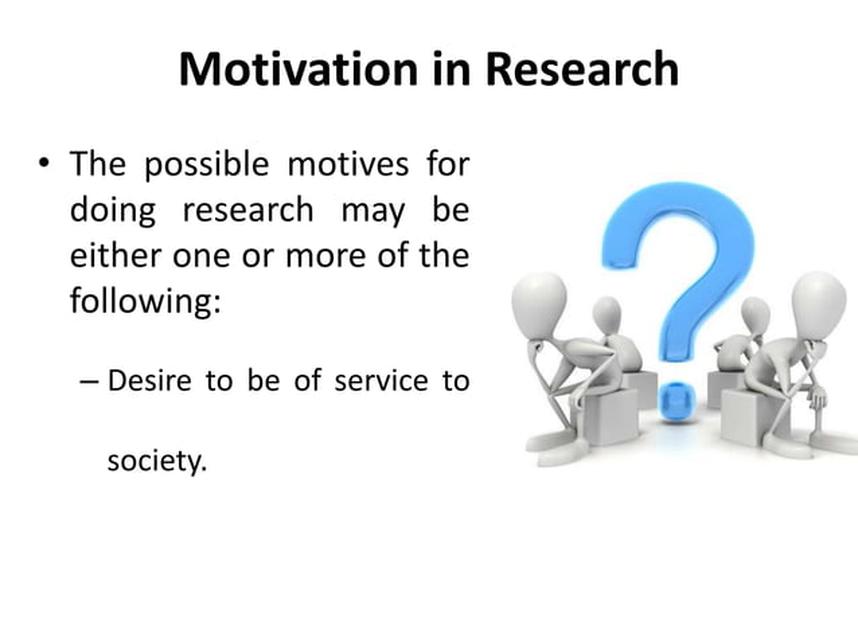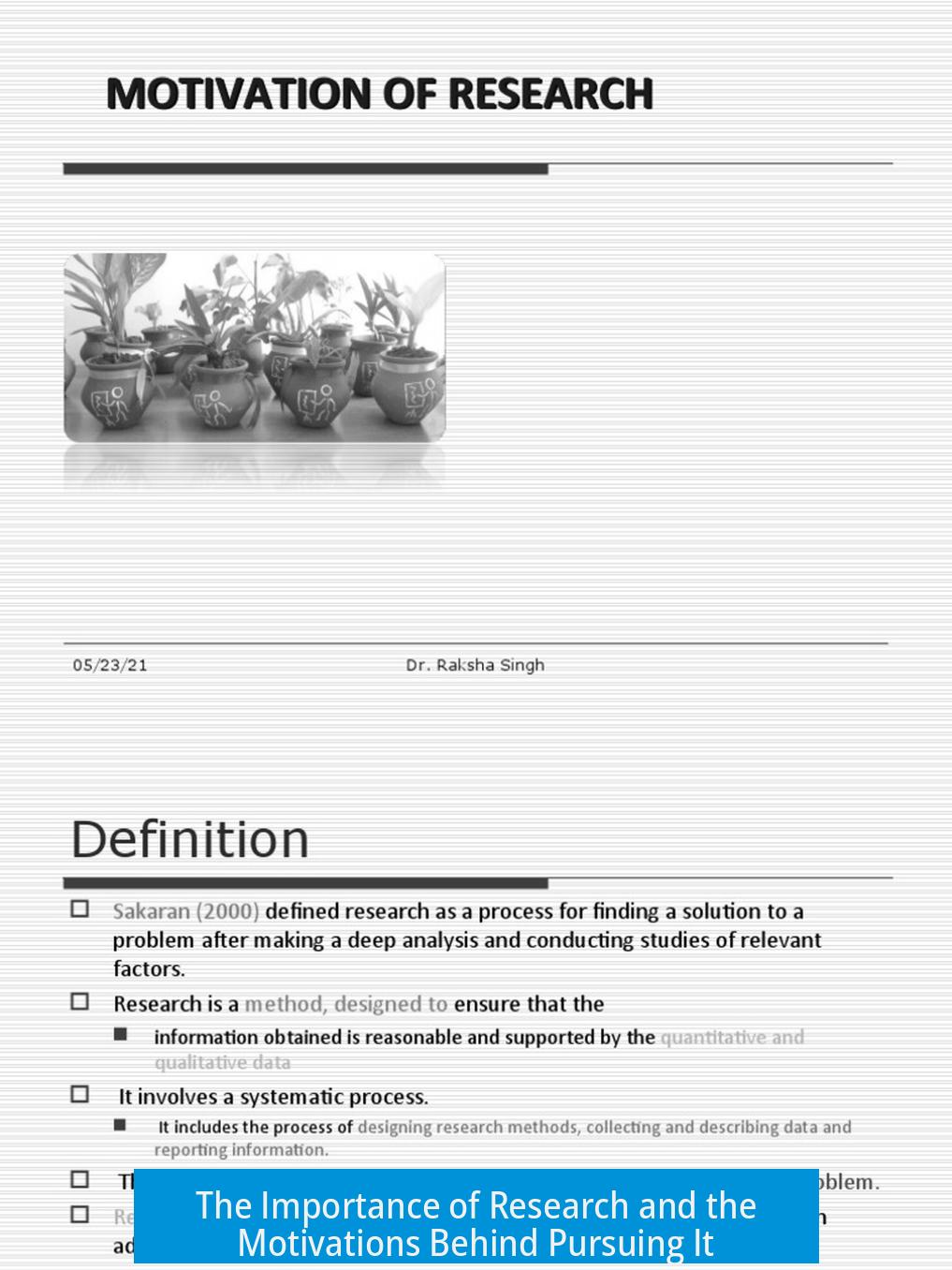Why Is Research Important?

Research is essential because it drives discovery and understanding that shape everyday life and future technologies. It transforms theoretical questions into practical advancements. From healthcare to communication, our modern world relies on continuous research efforts.
Everyday Impact of Research
Consider the smartphone in hand or the vaccines protecting against diseases such as whooping cough. These are products of sustained research and innovation. Textbooks that disseminate knowledge are themselves summaries of research findings. Research creates the foundation of what society builds upon.
Historical Example: The Quantum Leap from a Simple Hole
A century ago, Max Planck studied a seemingly trivial problem: the light emitted from a heated cavity through a small hole. Classical physics predicted infinite energy output, which was impossible. Planck discovered that light is emitted in quantized packets called photons.
This insight reshaped physics, leading to quantum mechanics. It redefined the atom from a vague model into a precisely described system governed by quantum laws. Quantum theory paved the way for engineering materials and inventing the transistor.
The transistor revolutionized electronics and computing, making it affordable and efficient. Today’s interconnected digital world owes its existence to that pivotal research on cavity radiation. This story illustrates how research into a simple question can transform the entire technological landscape.
Educational and Professional Significance

- Research develops critical thinking and practical laboratory skills.
- It deepens understanding of scientific processes and specific disciplines.
- Experience in research enhances CVs, improving career prospects in graduate studies and industry roles.
For society, research continues to generate technological advances that improve health, environment, communication, and many other sectors.
What Drives People to Do Research?
Curiosity and Novelty
Many enter research driven by the desire to explore uncharted areas. Working on unique projects offers independence and challenges that appeal to curious minds seeking new knowledge. Some find fulfillment in solving problems where no clear answers exist yet.
Love for the Process

- Engaging with experiments and developing new techniques creates intellectual satisfaction.
- Encountering setbacks often fuels problem-solving enthusiasm rather than discouragement.
- The dynamic nature of research keeps it interesting—no two days are the same.
Researchers often describe their work as a continuous learning journey where the process itself is rewarding.
Career and Lifestyle Choice
For some, an undergraduate research experience is pivotal. Laboratory independence and experimental design expose career preferences, sometimes shifting ambitions from clinical professions to research sciences.
The variety and novelty in research prevent monotony commonly associated with repetitive tasks in other jobs. Being part of advancing knowledge makes many excited to work regularly and find meaning in their efforts.
Personal Traits and Mentors
Personality traits such as curiosity, persistence, and a preference for tackling new challenges often predict enjoyment and success in research. Good mentors help guide emerging researchers by providing opportunities and advice.
Experimenting in different labs and disciplines can help identify specific interests and foster collaborations that keep research engaging and fulfilling.
Desire to Contribute and Societal Impact

Research is a collective endeavor to expand knowledge for the benefit of society. It holds the promise of improving lives, protecting the environment, and solving global challenges.
Many researchers are motivated by the aspiration to leave a positive legacy and improve the world.
Challenges and Realities of Research
Research is not always glamorous. It can involve repetitive tasks, frustrating failures, and demanding workloads. Unrealistic expectations, like curing major diseases quickly, can lead to burnout.
Some find the learning curve steep, particularly in complex laboratory settings. However, overcoming challenges often deepens skills and resilience.
Intrinsic Joy and Curiosity
Beyond societal benefits, research appeals to those who enjoy tinkering with devices, exploring scientific questions, and satisfying personal curiosity. It offers an environment where curiosity is a powerful asset.
Alternate Paths

Not everyone pursues research through formal education. Practical experience, trade certifications, and lifelong learning enable some to engage in research independently or later in life.
Modern access to information allows individuals to explore diverse topics without student debt, embracing a polymathic approach.
Summary of Key Points
- Research expands knowledge and enables technological progress essential for daily life.
- Historical research on simple problems can revolutionize entire fields, exemplified by quantum mechanics.
- It cultivates critical thinking, technical skills, and career opportunities.
- Curiosity, love for the research process, and desire to contribute motivate researchers.
- Research requires persistence amid challenges but offers intellectual rewards and societal impact.
- Mentorship and varied experiences help individuals find their niche in research.
- Alternatives to traditional research paths exist, allowing lifelong inquiry.
Why Is Research Important? And What Makes People Dive Into It?
Research is important because it shapes everything around us. You might glance at your phone right now and think, “Yeah, cool gadget.” But that phone is a marvel crafted from centuries of research, innovation, and yes, some seriously curious minds. Without research, many cornerstones of modern life—medical vaccines, computers, clean energy—would be nothing but dreams.
Picture this: you didn’t die of whooping cough as a baby. That’s not luck; it’s research. Vaccines, healthcare, antibiotics—all come from relentless inquiry. If you’ve ever flipped through a textbook wondering how those facts got there, know one thing: research is the bedrock beneath all our knowledge. It’s like the secret sauce holding the buffet of education together.
When a Nerd’s Curiosity Changed the World
Let’s rewind about a hundred years. A man named Max Planck got obsessed with something peculiar—a hole in a heated box. Not exactly “sexy” research, right? The theory said infinite light energy should flood from that hole. Spoiler: it didn’t.
Planck discovered light wasn’t continuous but came in tiny packets called photons. This nugget cracked open quantum mechanics, reshaping how we understand atoms.
Fast forward, quantum theory let clever nerds engineer matter, leading to the transistor’s creation—the tiny chip that makes your smartphone possible. Because of one man’s curiosity-driven research on holes in boxes, you get to stream cat videos today with zero guilt.
“So yeah, research is important.”
That story illustrates a critical point: research doesn’t have to be glamorous. It has to be genuine, pushing boundaries of what we know. That initial “silly” question can fuel revolutions that remodel entire industries and our daily lives.
But What’s In It for You? Why Should You Care About Research?
For students and professionals alike, research hones critical thinking skills. It teaches how to design experiments and troubleshoot problems. Imagine developing sharp lab skills and understanding complex processes deeply—not because someone told you to, but because you explored it yourself.
Even if you don’t plan on grad school, research looks stellar on CVs. Employers in professional schools or industries appreciate candidates who’ve wrestled with uncertainty, handled failures, and come out wiser. It signals you’re more than a test-taking robot.
The modern world is a patchwork of innovations sewn together by countless research projects. The cell phone in your pocket, the water safe to drink, the medicines that heal you—all trace back to research done by dedicated people. Every day, research pushes these boundaries a notch further, making life better for everyone.
What Makes Some People Want to Do Research?
Ask researchers why they jumped into this wild maze, and you’ll get fascinating answers.
1. Curiosity: The Original Spark
Many cite a pure desire to explore the unknown. One researcher said, “I wanted to work on something that no one else had ever done before.” That fresh thrill of discovery resonates deeply with inquisitive minds.
Others mention following their earliest curiosity, like kids playing with puzzles, except these puzzles could rewrite textbooks.
2. Exposure During Education
Sometimes it’s a lucky internship or an honours project that opens the door. “I was fortunate enough to do a couple of research internships in my final year and got to experience what an actual research lab was like,” one student recalls.
Another jumped into a unique project others avoided, enjoying the independence and problem-solving freedom. “Now I can’t imagine myself doing anything else,” they say.
3. Career Discovery—and Change
Research often redirects people’s futures. You might plan on becoming a medical doctor but realize that lab research excites you more.
Some find the repetitive tasks in certain labs uninspiring and prefer research areas with dynamic challenges. One researcher admitted, “Stepping into chemical labs gave me PTSD from all those endless organic experiments.” Research isn’t always glamorous, but it’s never dull for those who love puzzles.
4. The Joy of the Process
Many researchers confess their love for the process itself—the trial, error, and aha moments. “I love trying new reactions and getting to grips with different techniques,” says one. They even admit to liking it when experiments go wrong because it means a new problem to solve.
The intellectual challenge keeps the flame alive. Another shared, “I get obsessed about the really specific details in a really specific topic.” It’s this deep dive that keeps boredom at bay and curiosity fed.
5. Mentors and Role Models
Sometimes a mentor lights the path. “Watch podcasts with Neri Oxman,” suggests one researcher, naming a role model who inspired their journey. Finding the right guide can be pivotal in sticking with and loving research.
Research as a Career and Lifestyle
Many find research not just a job but a lifestyle. “Independence in the lab and experimental design made me realize I didn’t want to be an MD, but that I preferred synthesis research,” one scientist reveals. For them, grad school was a turning point leading to a fulfilling career—and even a life partner.
Others treasure the constant variety. “The projects are always changing. I would have gotten bored doing the same thing every day.” Research invites freshness.
And yes, some simply stumbled into it, “I picked research because I had nothing else to do, and wanted money (yay for grad school).” But they stayed because they found meaning in it.
Society’s Beneficiary and Your Role
“Research is how we make scientific progress,” a researcher states simply. It’s also a way to contribute meaningfully—leaving the world better than we found it. Whether curing diseases or innovating cleaner energy, research benefits society at large.
As we rely more on science and technology, the importance of research only grows. Every breakthrough hinges on someone, somewhere, asking “Why?” and relentlessly pursuing answers.
The Real Deal: Challenges of Research
But hold on—research isn’t all glitz and glamour. People often burn out when aiming for lofty goals like curing cancer overnight. The reality includes tedious, repetitive tasks and unexpected failures.
Some get turned off by the grind. “Advisors warned me about boring mass-scale tasks, and it dissuaded me,” one confessed. Others have traumatic experiences in intense labs but still press forward.
Clearly, research requires grit. The joys come with a side of frustration and patience. The key is enjoying the detective-like thrill of problem-solving.
Intrinsic Joy and Nerdy Perks
Researchers often describe quirky perks: the joy of “playing with goofy machines” or feeling “insufferable” around friends because of nerdy enthusiasm.
It’s not just work; it’s a passion. For many, researching is a way to live their curiosity daily.
Alternative Paths to Research Freedom
Not everyone follows traditional academic paths. Some pursue trade certifications and take continuing education classes without formal degrees. This meandering route can lead to self-directed research later in life.
“Now, as a retired old man with the internet and no student loan debt, I’m free to research across disciplines like a renaissance polymath.” A liberating thought for lifelong learners.
Wrapping It Up: Why Is Research Important and Why Do People Do It?
Research matters because it builds the foundation for our modern lives. From vaccines saving babies to smartphones connecting friends, every innovation traces back to curious minds asking, “Why?”
People dive into research for various reasons: intellectual curiosity, educational exposure, career discovery, love for the problem-solving dance, mentors’ influence, and the desire to make a mark on society.
Research is both a challenge and a joy. It demands patience, thrives on persistence, and rewards with the thrill of discovery.
Are you curious about the “holes in boxes” in your own life? Perhaps your next “really, REALLY stupid” question could ignite the next big breakthrough. Why not start exploring?Your world depends on it.
Why is research important in everyday life?
Research leads to developments we use daily, like smartphones and medicine. It explains how things work and improves technologies. Without research, many basic protections, such as vaccines, wouldn’t exist.
What motivates people to choose research as a career?
Many enjoy solving new problems and working independently. Some love continuous learning and the chance to explore unknown areas. Others find motivation in contributing to society or in the thrill of discovery.
How does research affect career development?
Research builds skills like critical thinking and lab techniques. It enhances resumes for jobs or graduate school. For some, a research experience shapes their future focus and career path significantly.
Why do some researchers value failure or obstacles?
Challenges are part of research. Many find solving problems rewarding, even when experiments fail. It drives learning and the excitement of figuring out solutions keeps them engaged.
How can someone start in research if unsure what to pursue?
Trying different labs helps find interests. Meeting mentors and joining groups can guide your path. Early exploration is more important than having a fixed goal at the start.





Leave a Comment